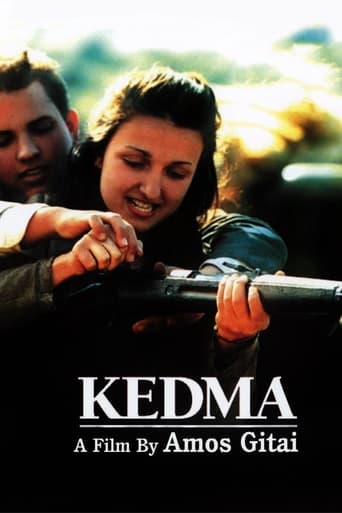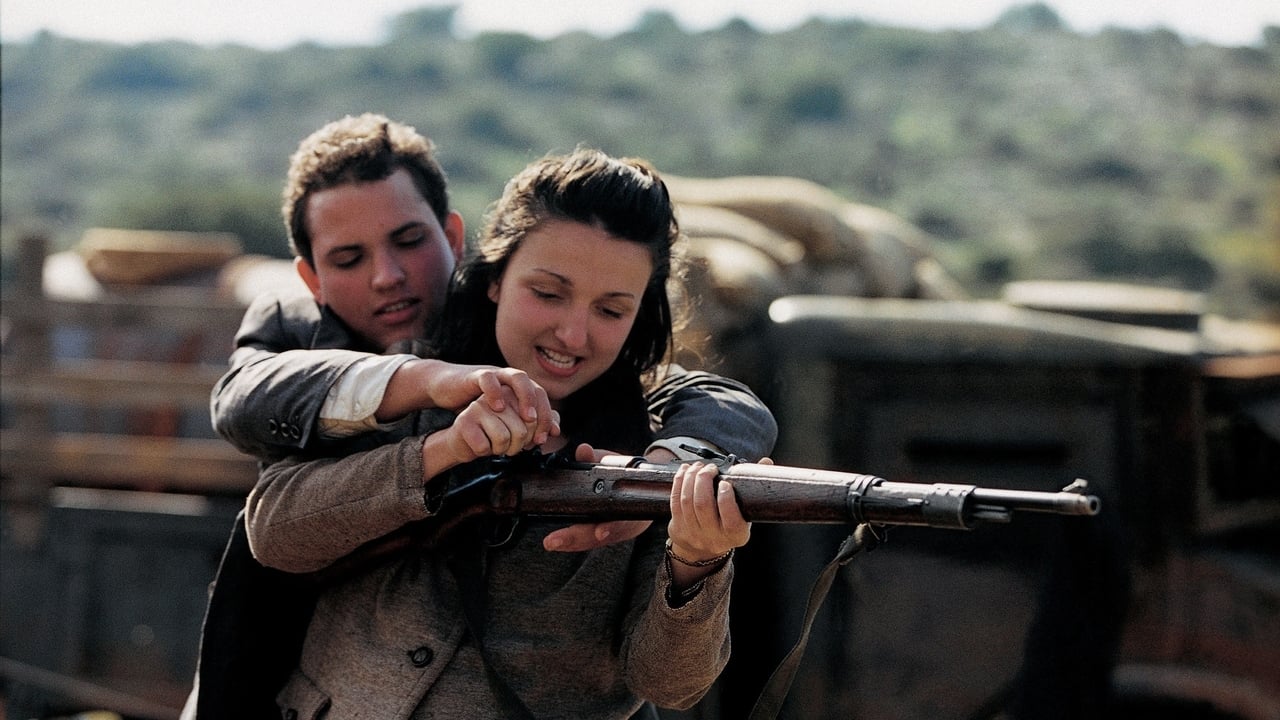samkan
If our megaplexes would play nothing but slice of history works like KEDMA we would all be more sympathetic and compassionate. This film depicts a small slice of an historic migration that, truthfully, requires a bit of acquired knowledge by it's viewers. That said, it's almost done in realtime (which some may find boring or exhausting) and the character dialog can get a bit preachy at times. But excellent effect. Deserves reverence if only for its passion and determination. The soliloquy at the end is a bit much and mars the otherwise muted and ambiguous nature of the story of the creation of Israel. But the overall effect is quite profound. Fervor and desire by the filmmakers herein overcomes lack of technical expertise.
luckystrike6
I'm not sure I got what I was supposed to get out of this film. As a piece of cinema it was an interesting way to shoot a low budget movie. With long, almost entirely wide-angle shots that hardly move at all, (except for a magnificent opening sequence and some hand-held work later on) it's staged and paced like a series of short plays. Some of the settings are just too simplistic; visually there isn't a lot going on besides the stories of the people coming in and out of the frame. There's no main protagonist in the film; numerous characters come and go, unresolved, sharing nearly equal screen time, but never quite enough of it to make any one of them more than a two-dimensional expression of a social theme. This dispassionate attitude gives "Kedma" a very documentary feel for the first two acts. It is the third act which is confusing, and even as a Jew with family in Israel, I feel severely underqualified to interpret Amos Gitai's true intentions with it. Watched with one set of eyes, it could be called a relatively simplistic portrayal of the birth of a nation, which throws its hands up to a certain extent and spreads the blame for the current situation around widely enough to defuse the certain blowback this film was to receive from the Orthodox community. On the other hand, in blaming Christianity, the Talmud and the Messianic tradition for enforcing the diaspora mentality over the past 2000 years, it stops right on the doorstep of declaring the modern State of Israel a product of the Jews' inheritance of the Nazi mentality which drove them there in the first place. Now: This isn't what I'm saying, but it might well be what the film is saying. At the very least it states boldly that the heroic Sabra stance is nothing more than the bitter side of the slave mentality, an ongoing form of self- flagellation. Only, the movie doesn't give you any inkling that this is where it's taking you as it leads you on in documentary form; and the result is definitely shocking. This is not a movie which apologizes for any outburst of emotion; nor does it pay much homage to the myth of the historical Maccabee. In short, it is about the weak preying on the weaker. Whether or not its stance is correct or covers the entire picture, again, I'm not qualified to say. There are certainly several other sides to the conversation than the one this film snakes its way into advancing. It's not a coincidence, either, that "Kedma" is the name of the refugee ship the Jewish characters arrive on; this movie, if nothing else, is the anti-"Exodus." None of the above, by the way, makes this film particularly enjoyable to watch. But if you like watching painful and well-crafted work that makes you think, well...it's still not that enjoyable to watch, but at moments it's completely riveting.
das417
I like this movie in many ways, mainly because it's honest portrayal of the creation of modern day Israel, and what happened so that nation could be born. Kedma is a powerful story of triumph in terms of surviving the Holocaust, and the story of another tragedy of those who had to endure war and more loss.The Palestinian situation is also well shown in an unbiased way. I was glad that their side of the story was shown; though by saying this I am not trying to be political. I am saying that in a war like this, both sides need to be heard to understand the tragedy of what was going on.Is this a great movie? Yes and no. The story simply dragged in too many points, spending too much time describing characters and situations. I am sure this was the director's intent and it does serve the story somewhat. I knew this wasn't going to be an action movie, however I was expecting a bit more then brief rare lines and over dramatic philosophizing. Most of the movie just seemed to empty.This would be a good movie for a class studying Israel. I would recommend it to anyone who has studied the history of the Jews and Israel.
mleach
Opening with a virtuoso and near-wordless sequence, set in May 1948, in which surviving European Jews arrive by boat in Palestine, eight days before the creation of the state of Israel, the provocative and often controversial Gitaï's latest interrogation of his nation's history and challenging contemporary reality focuses on one of its key originating moments. As the passengers look to disembark, they are shot upon by British troops intent on stopping them, and caught up in the retaliatory fire of the Jewish secret army, seeking to aid their arrival. Proceeding to follow the immigrants on their first steps in the 'promised land', Gitaï casts a considered but unflinching eye over the founding conceits of his country. Putting the issue of territory centre-screen, and given undoubted extra resonance by the current situation in the Middle East, it's also telling about British imperial responsibility in the region. However, at its heart is a personal and communal story, of displacement, anticipation, endurance and comradeship, wide in its appeal and generous, while demanding of all sides, in its understanding.



 AD
AD
